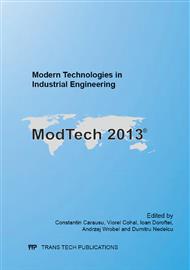p.634
p.639
p.645
p.651
p.657
p.663
p.669
p.675
p.682
Factors Influencing Employees' Motivation for Knowledge Communication
Abstract:
Achieving high performances in organizations requires motivated employees who engage in training activities, acquiring knowledge, new abilities and skills, which they intend to share and communicate in order to improve the performance of their work activities and thus to contribute to the overall organizational performance. Therefore, by establishing the most important motivational factors for key employees there can be identified various aspects which determine employees to use, communicate and share the knowledge, skills, and attitudes acquired during training activities. This research aims at bringing into light some analyses related to employees motivation for attending training programs and knowledge communication during and mostly after training programs and the influence on the improvement of work activities and the obtained job performance. There will be also identified the intrinsic and extrinsic incentives which stimulate the employees to obtain new knowledge and skills and to communicate them, explaining as well the influence on the organizational outcomes. Therefore, by analyzing the prevalent motivational factors which determine managers and employees to engage themselves in training activities, we could establish also the degree of employees motivation to attend training programs, to communicate knowledge and improve work activities and organizational outcomes. In this view the investigation carried out by the authors was based on quantitative research techniques, by means of a questionnaire based survey using a non-probabilistic sampling method due to the initial stage of this research and its current limitations. The sample will be based on industrial firms from the North-East Region of Romania. There will be analyzed the relationships between employees motivation for knowledge communication, fostered by the training programs attended, and the performance improvement of their activities, attempting to demonstrate the influence of employees motivation to communicate the acquired knowledge during training programs on improving activities and the performance level at the workplace. It is noteworthy that this research study provides an integrated framework illustrating the main findings regarding the factors which motivate employees working in industrial companies to participate in training activities and to communicate the knowledge acquired during training programs, highlighting as well the influence of these issues on improving their work activities and the overall company performance. This framework could be further used by managers and academia as well, as a vehicle for improving organizational performance.
Info:
Periodical:
Pages:
657-662
DOI:
Citation:
Online since:
November 2013
Authors:
Price:
Сopyright:
© 2014 Trans Tech Publications Ltd. All Rights Reserved
Share:
Citation:


